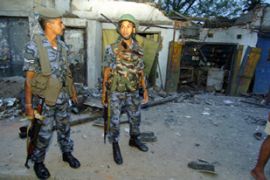Sri Lanka says ceasefire pact holds
Foreign minister says the government are waiting for the Tamil Tigers to respond.

The foreign minister’s comments come days after Mahinda Rajapaksa told Al Jazeera in an exclusive interview that the ceasfire was effectively dead.
| On the scene | ||
Al Jazeera’s Tony Birtley gets exclusive access to the heart of the conflict in the east of Sri Lanka |
Also on Sunday the LTTE shelled a Sri Lankan army artillery position killing at least one, and wounding 15 soldiers.
The LTTE targeted the Pampaimadu military base where security forces have placed a long-range gun to target the Tamil Wanni region in the island’s north, an official source said.
The LTTE, fighting for an independent state in the island’s north and east, last met the government for talks in October 2006, Bogollagama said.
For months, the Sri Lankan military and LTTE have engaged in almost daily skirmishes as well as land and sea battles, while an estimated 4,000 people have been killed in the violence since last year.
Surprise attack
The LTTE caught the military by surprise in March when they used light aircraft to bomb an air force base next to Sri Lanka‘s international airport north of Colombo.
| Conflict in Sri Lanka |
|
Tamil minority make up 12 per cent of island’s 20m population They complain of discrimination from strengthening Sinhalese nationalism Decades of protest erupted into civil war in 1983
Up to 70,000 have died in fighting, both sides accused of atrocities
Ceasefire in 2002 led to period of relative peace
Rebel attacks surged in late 2005, intensified fighting since and renewed calls for Tamil state |
It was the LTTE’s first aerial attack, and they warned more air raids would follow. A month later, the Tamil Tigers launched another, bombing oil facilities near Colombo.
“They can [use] one single aircraft, and create some sensation,” Bogollagama said. “But at the same time, we are very capable of meeting this challenge, and we will show that.”
Bogollagama said there was room for the Tigers in Sri Lanka‘s governance if they stopped using violence.
“They can do well, and come through the democratic stream, and be engaged in the representation process in a pluralistic society, and be part and parcel of their own pursuits in their representative people.”
The minister told the International Institute for Strategic Studies’ conference in Singapore that “the LTTE’s capacity to be a threat to international shipping is clear.”
He also said the violence threatened Sri Lanka‘s economic interests, including oil exploration off the northwest coast.
Sri Lanka has offered China and India one block each for exploration and has another six blocks which are due to go to tender, Bogollagama said.

